Anxious Mind? With so much noise and stress around us, it’s almost impossible to avoid feeling overwhelming anxiety every day. Here’s how to find relief.
We live as a nation of chronically stressed and overburdened people with an endless march of commitments, appointments, and obligations.
We frequently live our lives in a hurry, going through each day automatically, finishing one task after another until we are completely worn out and fall into bed. We are constantly thinking, planning, regretting, and worrying due to the chaos and demands on our minds.
Given how little time we spend in our bodies, grounded, connected, and still, the fear is understandable.
For as long as I can remember, I have battled anxiety. My sensitive personality and difficult upbringing surely influenced who I am. Persistent worry and fear showed themselves as people-pleasing, perfectionism, and ongoing shame. I did not feel like I fit in with my friends, family, or the wider world.
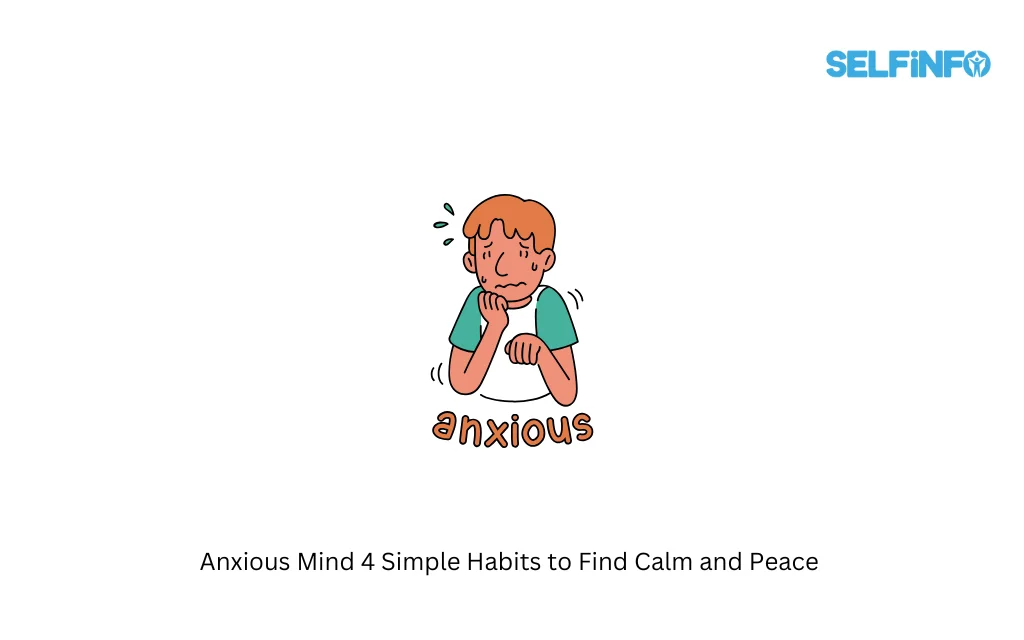
I discovered that I should treat myself as poorly as other people. My worst abuser and critic was me. I was unable to handle these intense emotions of humiliation and terror on my own, and I felt broken. In the midst of confusion, hostility, and negativity, I distanced myself from myself and closed my heart.
With a force I was not prepared for, motherhood ripped me back open. I wanted to provide my kids with the same level of love and security that I had not received as a child, but the strain of parenting three small children was too much, and my anxiety took over. Recalibrating my thoughts, reestablishing my connection with myself, and regaining my footing took years.
There is a gentle method to overcome chronic stress and overwhelm, but it calls for our undivided focus and presence as well as the formation of new, healing habits.
Small, gradual improvements that move us away from ongoing stress and worry and toward a more flexible and tranquil way of living are possible with practice.
Even if we may not have much control over most aspects of life, we should concentrate on the things we can manage.
Cutting out on sweets, alcohol, caffeine, and processed carbohydrates, as well as getting enough sleep and exercising, are just a few of the numerous body-based strategies we can use to manage our stress and lower our cortisol levels. However, they by themselves will not make you feel less anxious. You also need to address your mental state. Here’s how.
1. Carve out time for stillness and flow.
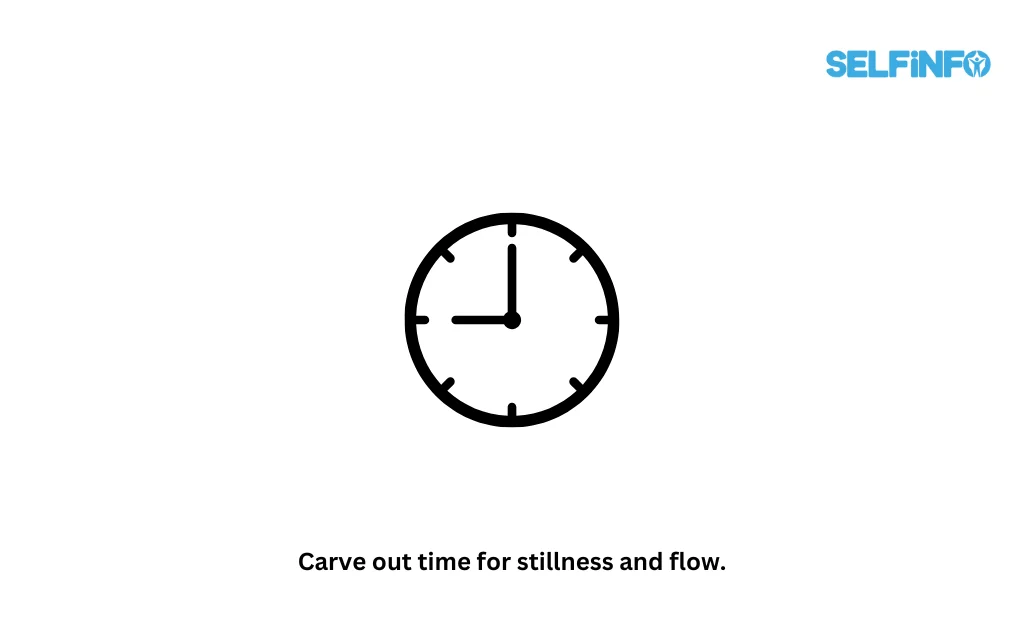
We need to make time in our hectic schedules to slow down and engage in activities that provide us with moments of flow, tranquility, and space in order to counteract our extraordinarily fast pace of life.
Our days are full of activities and noise that demand our continuous focus. As a result, we must intentionally schedule time for activities that feed and rejuvenate us, such as solitude, nature, and creativity.
Through yoga, art, and the outdoors, I reestablish my connection to flow and calm. I find the quiet and leisurely pace to be calming and comfortable, whether I am posing, sketching, or strolling through the woods. I lose myself in the sensations I get to enjoy—the noises, the fragrances, the beauty all around me—and forget all my problems.
As I lose myself in an act of amazement, awe, or creation, it is as if my life is momentarily suspended. It is really soothing and fulfilling.
Establish regular routines that intentionally slow you down and direct your focus within. Make sure to include those times in your self-care regimen. Give yourself the luxury of peace and quiet by disconnecting from the hustle and bustle.
Set aside at least fifteen minutes each day for some alone time. Enjoy the space and happiness of being alone and quiet during this time by spending it alone in your garden, on a mat, or in bed. Rekindle your inner sanctuary and find new, fulfilling ways to take care of yourself.
2. Befriend your mind.
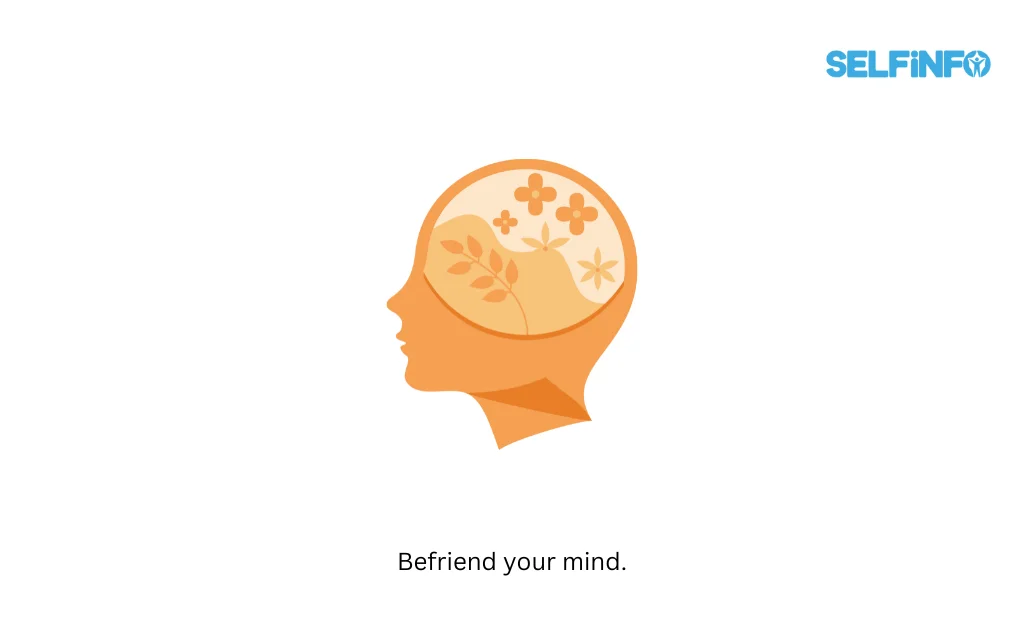
We intentionally operate on autopilot for the majority of the day. However, we are only letting habitual ideas and behaviors rule our lives, for better or worse, if we do not pay attention to where our minds go and what they do.
I used to be completely unaware of what was going on in my mind. This alienating lack of profound self-awareness had an impact on many facets of my life, particularly my relationships.
For instance, I would heedlessly react out of pain and embarrassment (yell, shut down, get defensive, or get extremely emotional) since I had never learned how to handle conflict constructively. This just served to further exacerbate issues and alienate me from other people.
I would then dwell on unresolved disputes and past injuries, feeling guilty and ashamed, which fueled my anxiety and left me feeling hopeless, despondent, and unable to go on. Even though I did well in school and at work, I could not understand why everything appeared to be against me and why I had such a hard time interacting to other people.
I eventually came to the conclusion that it was unhealthy to oneself and to other people to constantly worry about the future while harboring resentment toward the things that had happened to me in the past. My life was progressively being destroyed by living in my thoughts, which was causing me more anxiety. In order to find some serenity and learn how to live differently, I ultimately made the decision to try mindfulness.
My unconscious tendencies and beliefs came to light as a result of practicing mindfulness. I now understood how I internalized a great deal of shame, fear, and mistrust as a result of growing up in an environment of constant rage, instability, and misery as well as a lack of love and support. And up until today, that was subtly controlling my life!
I discovered how to use mindfulness to watch my thoughts and where they take me, identify instances in which I undermine myself, and work against my principles and objectives. And rather than brutally criticizing myself for my shortcomings and mistakes, mindfulness taught me to accept responsibility for my life and my actions; that I have the ability to do things differently; and that I am not damaged, I only lack the necessary skills—yet. Over time, mindfulness helped me recover by breaking the cycle of pain, worry, and shame I was experiencing.
The antithesis of anxiety is mindfulness, which is empowering. It teaches us to be open, slow down, and watch what is occurring inside and around us, as well as to respond honestly rather than routinely out of guilt or fear, rather of fretting and frantically trying to control our surroundings.
We are able to appreciate the world in all its complexity because of this increased awareness. We gradually come to appreciate life’s little joys, letting go of constant anxiety and never-ending diversions. We get the flexibility to think and behave differently, form new routines, manage challenging emotions, get past our obstacles, and learn to accept life as it comes.
3. Practice grateful living.
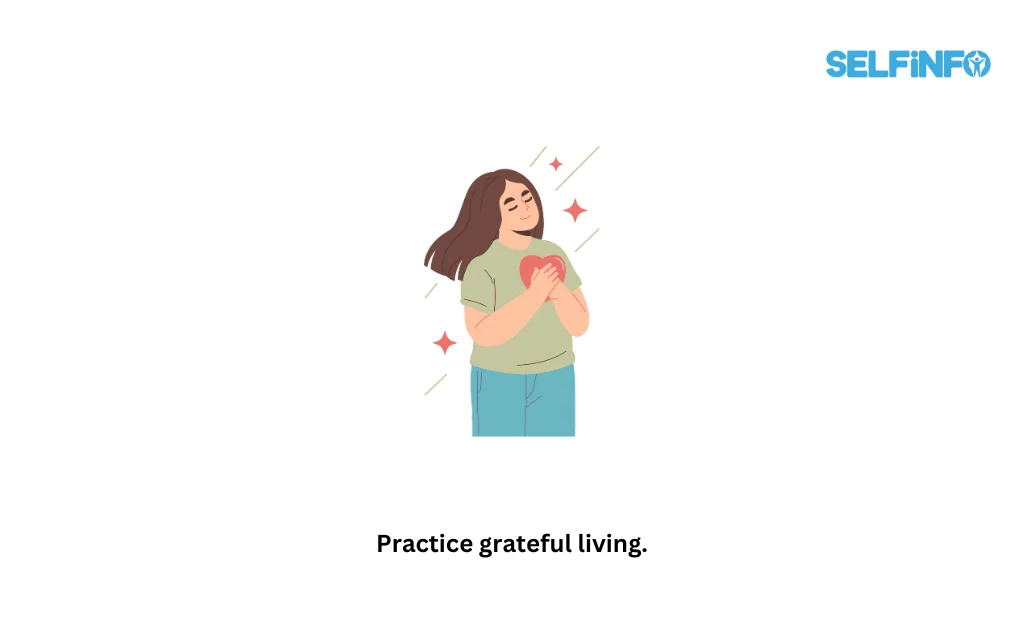
Because of our inclination toward negativity, we frequently fixate on issues and give them far more attention than is necessary, which causes worry. If uncontrolled, this can negatively impact our day and leave us in a chronic condition of worry and stress.
Fortunately, this prejudice is not unchangeable. By focusing on the good things, the small things that make us happy and brighten our days—moments we might have otherwise overlooked in the thick of our stress and overwhelm—we can change it.
Being grateful is about being in the now and enjoying it, but doing so requires being truthful and conscious of your feelings, thoughts, and emotions. You start to equally incorporate all aspects of your life, both positive and negative, highs and lows, when you take the time to do this. Eventually, cultivating an attitude of thankfulness might change how you view the world. You see that despite all the challenges, there is a lot of joy and beauty in it.
Keeping a thankfulness diary is something I really like. Actually, this was the beginning of my personal recovery process. For my nervous mentality, gratitude was like medicine.
A journal made especially for this purpose is available for purchase. Make it lovely by decorating it with colored pens so that when you open it, you feel happy. Every day, write down three to five things for which you are grateful.
When did you experience a peaceful moment? What was it that made you smile? Which instances of beauty or kindness have you encountered? Bring those events to life in your mind by immersing yourself in them.
The more time you spend thinking back on the things that made you happy during the day, the more time you will have to maintain the relationships that make you feel at ease, at peace, and in awe. This will teach your mind to avoid fear and concentrate on the positive.
4. Reconnect with yourself.
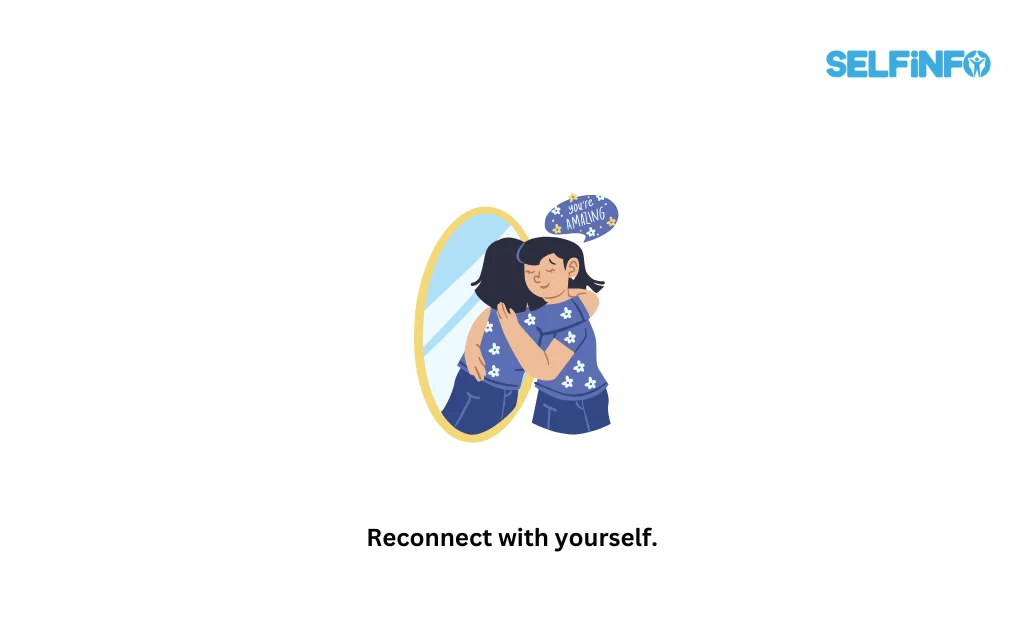
The sensation of being overwhelmed by errands, professional commitments, and family duties was a major contributing factor to my anxiousness. I was constantly moving and never stopped to consider my feelings, needs, or desires at any one time.
I had lost touch with my own desires and my true self since I had been brought up to be helpful and considerate of others, as our patriarchal society requires.
It can be difficult to change, particularly if our sense of self is weak. Therefore, it is critical to rediscover your inner nature, whether via therapy, play, meditation, or journaling. After experimenting with a variety of techniques, I discovered that writing was the most effective way for me to reestablish a connection with my innermost self.
By keeping a journal, we can develop a close relationship with ourselves and establish genuine connections with our inner selves. As we connect with our deepest needs, desires, anxieties, and hang-ups, we progressively get a deeper awareness of who we are and what we have experienced. We may develop our resilience, rediscover our inner strength and courage to conquer our challenges, and restore control over how we see and react to life by keeping a journal.
I wanted to do everything in my power to protect and nurture her, to give her everything she had never had as a child, once I had reconnected with my inner essence, my inner child.
For instance, rather than merely enduring the agony and suppressing my pain, I showed myself compassion when I failed or felt harmed. Instead of repressing my feelings, I wrote in my journal about things that disturbed or perplexed me. Before I became overwhelmed, I took breaks. I set aside time for my favorite activities, which include reading, dancing, drawing, and taking bubble baths.
It was all about love and nurturing, which I thought was lacking in my own upbringing, and it was similar to self-parenting. And when things became tough, it inspired and strengthened me to stand up for myself. It gave me the strength to persevere and enhanced my capacity to bring about long-lasting changes in the areas that were most important to me.
Although the aforementioned tactics may seem straightforward, the body and mind react when you begin to combine these minor routines.
Calmness soothes our frayed souls like a balm. We may slow down and react more effectively to the anxiety-inducing situations we frequently encounter when we practice mindfulness. Self-awareness enables us to identify and comprehend our feelings, and gratitude provides us with perspective, both of which contribute to our resilience and strength.
When combined, those practices can significantly lower your everyday worry and tension. Additionally, you permit healing to occur when you support and nourish yourself on a daily basis.
It requires practice. We must be patient, calm down, and accept things as they are in order to heal. Knowing that we are developing our skills and making the adjustments we can at the moment, and that we will go deeper when we are ready to do more, requires us to have faith in ourselves.
These four techniques can calm your body and mind and help you go from a constant state of tension and overload to a more tranquil way of living, regardless of whether you have had anxiety your entire life or it has only recently started to bother you.
